I’ve never felt more grateful or alive than the week after I thought I might die. I was backpacking in the Indian Himalayas with a college girlfriend in 2001. We were completely lost in the wilderness, without any sign of a trail or civilization. And we were out of food. Just when we had given up any hope, we saw a glimmer of moonlight reflect off a distant hut several miles away.
A few days later, we were well-fed, rested, and recovered in the holy city of Rishikesh. Up to that point, I had never experienced such a deep sense of gratitude for simply existing. What Michael Pollan calls the mind’s “reducing valve” opened up, and I was hyper-sensitive to everything: the taste of a banana pancake, the sound of a Dire Straits album, the gurgling of the Ganges River flowing by.
When we got lost, I was halfway through a paperback I had pilfered from a hostel. Veronika Decides to Die has all the expected cheesiness yet emotional resonance of a Paulo Coelho book. It follows the story of Veronika, a 24-year-old Slovenian who appears to have everything—youth, beauty, a stable job, and a comfortable life—but feels unfulfilled. She attempts suicide by overdosing on sleeping pills, only to wake up in a mental institution, where she is told that the overdose has irreversibly damaged her heart and she has only a few days to live.
Faced with life’s finitude, she begins to experience the intense emotions and experiences that eluded her comfortable, privileged life.
Sipping a hot cup of chai in Rishikesh in 2001, I felt like Veronika. I felt so good after nearly dying, I wrote a note in my journal to tell future-me that if I ever fell into depression, the antidote was to do something so difficult, even life-threatening, so as to remind myself of the magic of living.
Feeling alive at 18,500 feet
A couple of weeks ago, I met up with my cousin, Ian, and a longtime friend, Pablo, to climb Mexico’s highest peak, el Pico de Orizaba.
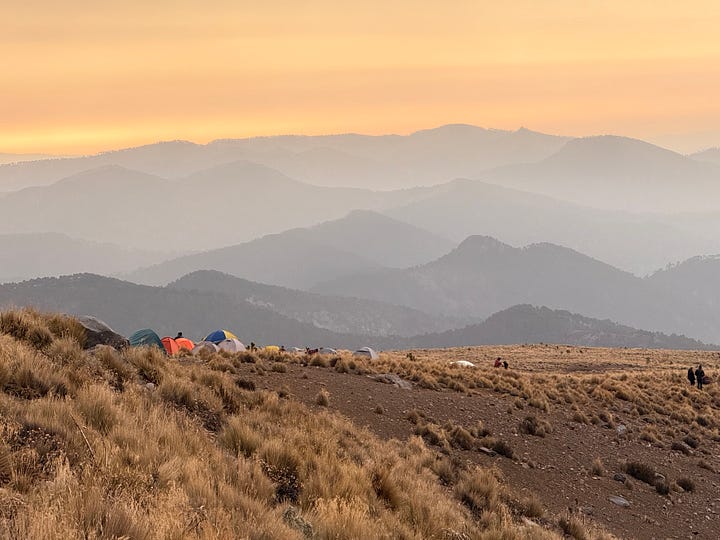
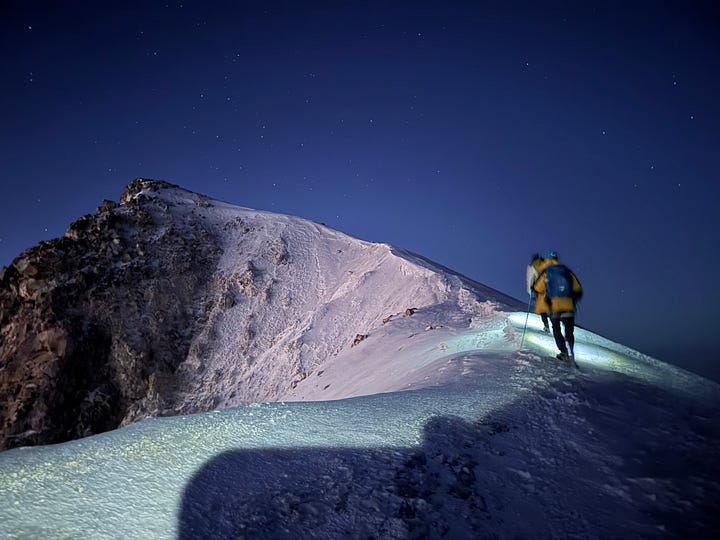

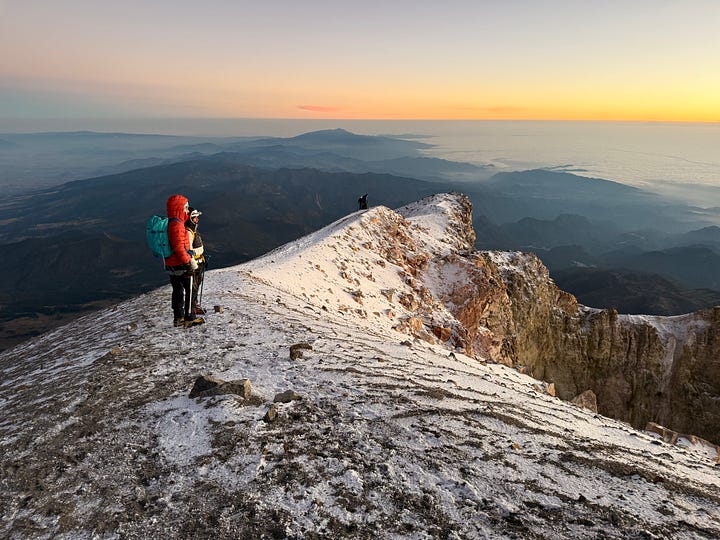
After a few hours of restless sleep, 14,000 feet above sea level, we got up at midnight to eat some pancakes to fuel our ascent. The first half was easygoing. By the time we reached the mountain’s last (and quickly disappearing) glacier, we strapped on our crampons, and our breathing became noticeably more difficult. We shuffled along slowly like old men as we neared the summit; fortunately, we made it just in time for a spectacular sunrise. We were on top of the world, literally and figuratively. Once I caught my breath and my heart rate subsided, I felt the same sense of hyperawareness and gratitude for simply existing.
On our way back down, we ran into “Tocayacsónfaib,”1 our second guide. He was with an unfamiliar young woman who looked like she had seen a ghost. We learned that she had nearly fallen down a cliff to her death while descending alone. Another climber spotted her and screamed for help. Our guide managed to lower a rope and slowly pull her up to safety where she broke down sobbing, as did everyone watching.
She shouldn’t have descended alone, and her group shouldn’t have let her. Mountaineering is inherently dangerous and they made it more so. The week before, a young man from Monterrey (having watched too many YouTube videos methinks) tried riding his bike down Pico de Orizaba and flew off a cliff to his death. Even if you don’t tempt death, it can still find you on the mountain. Last year, four experienced climbers died on the mountain after getting trapped in bad weather.
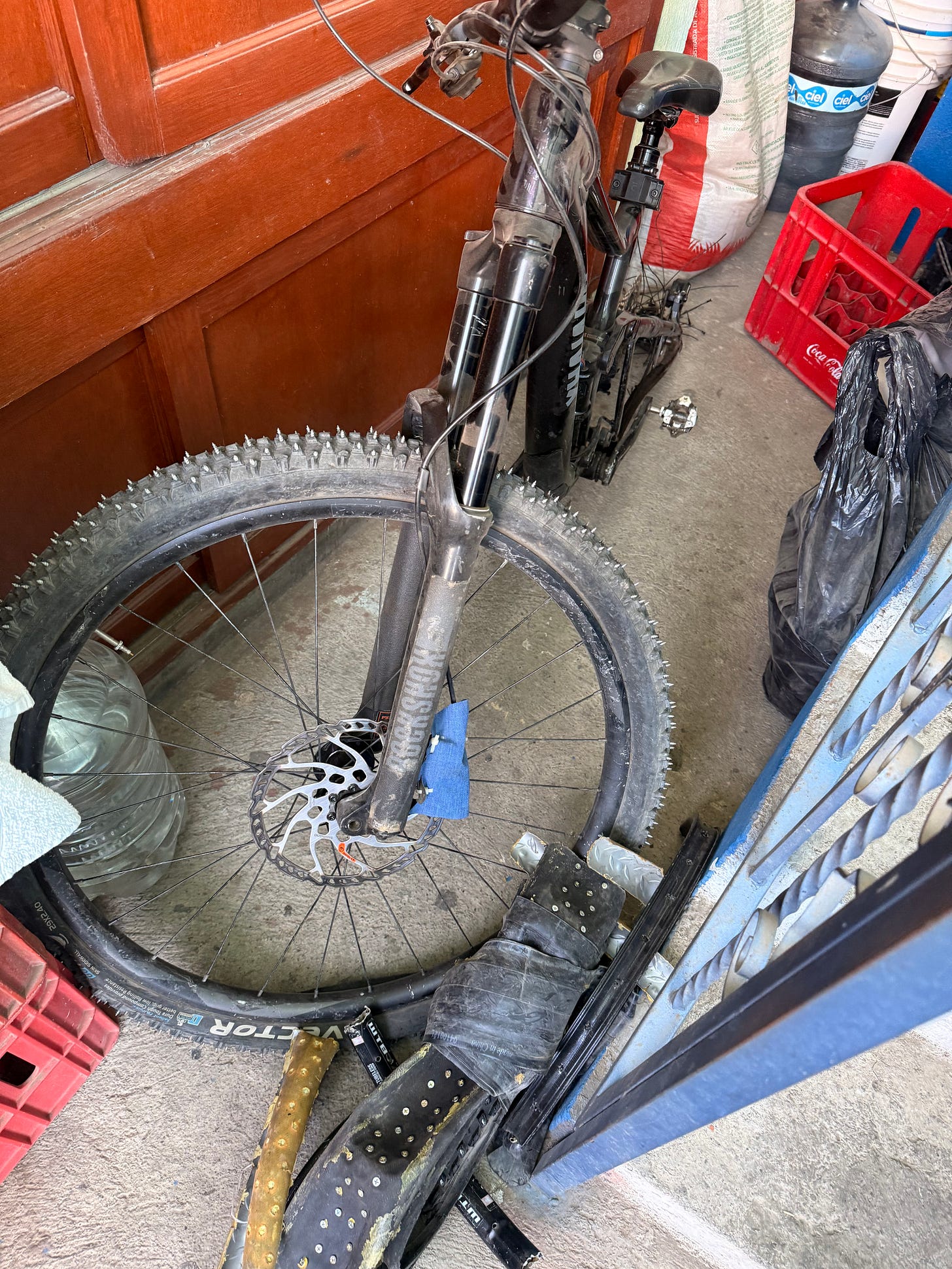
The danger makes you feel alive. So long as you stay alive. But why are we drawn to danger in the first place?
Why do men especially seek danger?
Over the next few weeks I plan on writing more about my work at the American Institute for Boys and Men and the observations of its founder,
.I’m pretty sure you’re gonna get sick of me agreeing with 99% of his writing, so why not start with my 1% of disagreement? On a recent appearance on the Theo Von pocast, Richard says:
50% of men across human history didn't have kids at all. They didn't reproduce. Now, there's all kinds of implications for that […]
And so if you're a low status man, there's a good chance that you're just not going to reproduce at all. Your DNA is not going to go anywhere. And under those circumstances, you will risk almost anything to raise your status.
Go to war. Go exploring. Turn to crime. Do anything to try and get yourself up that hierarchy so you have a chance of reproducing […]
And one consequence of that is men on average are more risk-taking than women, even today, which is why they go skydiving.
So just from an evolutionary perspective, if you're a woman, you are highly incentivized to protect your own body, right? You're the one who's got the future and you're going to have a kid.
I encourage you to listen to the whole episode.2 Richard’s larger point is that there are real differences, on average, between men and women; and as a society we should channel those differences productively.
But since I’m pretending to pick a fight, does Richard really think that my cousin and I are drawn to risk-taking behaviors because we are low-status men desperate to spread our seed? My guess is that he will say “yes and no.” Not everything comes down to status and sperm, but research does associate higher testosterone with more risk-taking. And, men routinely cite risk-taking as a key trait of masculinity along with strength and dominance.3
It could be tempting to see risky activities like mountaineering, skiing, and cycling as dick-measuring contests. I don't doubt that the dynamic exists.
But my experience engaged in risky activities with male friends is anything but. We plan for safety, avoid unnecessary risks, and look after each other. We never push each other to take risks that we're not comfortable with. We’re not tempting death to impress the girl. Rather, we’re trying to get away from the stultifying mundaneness of screens, meetings, and commutes.
Nature heals. The risk of danger sharpens the senses. And knowing that your crew is looking out for your safety creates a special sense of solidarity.
And it’s not just for men. When I first started climbing mountains as a teenager, it seemed like 90% of us were men. But on Pico de Orizaba, at least a third of the climbers (including the guides!) were women.4
Whatever your gender, highly recommended.
Yours,
David
We called him ‘Tocayacsónfaib’—a bizarre, Mexicanized portmanteau of Tocayo and Jackson Five. Why? I have no idea.
It’s uncharitable of me, I admit, to pull an abbreviated excerpt from a two-hour podcast conversation.
As a result, men associated with traditional masculine traits are responsible for more car collisions and fatalities.
I have a hunch that — much like participation in sports — more women are getting involved while men’s participation is either holding steady or even declining. But more on that in an upcoming newsletter.

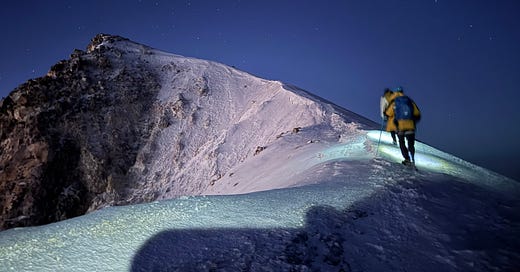


Awesome post and congrats on the summit!
Something that Alex Honnold has said a number of times about free soloing comes to mind. Someone had asked him if he was a thrill seeker, and he responded that no, it was the opposite. If you are getting an adrenaline rush while soloing, it means that something is going wrong. The usual state is one of flow, focus, thoughtless action. You only lose that zen state of mind if things are going wrong.
Like you said, when I go backcountry skiing or climbing, my friends and I are above all else focused on mitigating risk (I wouldn't say the same about mountain biking, which is why I'm trying to back off from that sport). As you increase your technical skills, you may be better equipped to handle subjective risk, and therefore you are able to take on more challenging and difficult goals. But the objective risk is always there--rockfall, bad weather, etc. Some argue, I would say convincingly, that having some risk there is part of what creates meaning in the activity. Because after all, climbing to the top of a mountain is an inherently meaningless activity, so we have to create the meaning ourselves. In "Conquistadors of the Useless", the fantastic autobiography of French mountaineer Lionel Terray, he wrote, “Running risks is not the objective of the game, but it is part of it.”
This was a delightful read! And the photos are incredible.
I also don’t agree with that part of the Reeves podcast, but I fear that you and I might be in a minority of masculine thinking, especially when it comes to dick-measuring pursuits and competitive mentality. Although I do highly value the stories that arise from thrill-seeking adventures and near-death experiences, I wouldn’t say the impetus is to frame myself as a potent man of sorts. Maybe potent with life in a different sense- a worldly sense, full of experience and laughter and emotion. For what it’s worth, I don’t even want kids. (I will listen to the full podcast though)
And on this line specifically: “I wrote a note in my journal to tell future-me that if I ever fell into depression, the antidote was to do something so difficult, even life-threatening, so as to remind myself of the magic of living.” - I’m going to note as a reminder to myself and a pat-on-the-back to you for the work you’ve been putting in. I only see/read a fraction of your life’s existence, but it seems and sounds magnificent to me, whatever that’s worth. Keep doing your thing and thank you inspiring me to do the same.